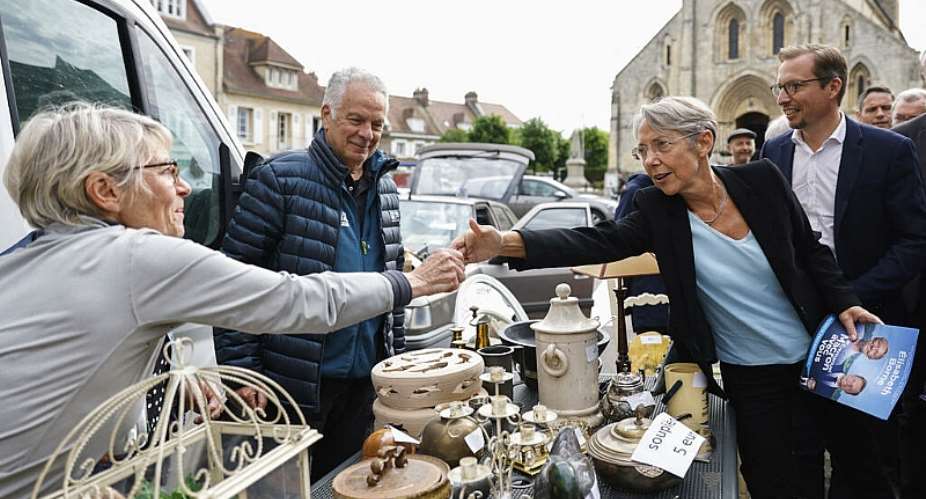Just seven weeks after re-electing Emmanuel Macron as President, the French are invited back to the ballot box this Sunday for parliamentary elections, with Macron and his allies seeking to retain a majority in the face of a strong challenge from a left-wing coalition.
Sunday is the first of a two-round process to decide which of the 6,293 candidates will take up the 577 seats in the National Assembly.
The shape of the new parliament will become clear only after the second round, a week later, on 19 June.
The ballots provide the concluding chapter to April's presidential election, when Macron beat far-right Marine Le Pen to secure a second five-year term in office.
He pledged a transformative new era after a first term dominated by “yellow vest” protests, the Covid pandemic and Russia's war against Ukraine.
On Thursday Macron acknowledged the stakes were high, warning French people against choosing "extremes" that would add "crisis to crisis".
"If the presidential election is crucial, the legislative election is decisive," he said on a visit to the rural Tarn region as he asked for a "strong and clear majority".
Quest for a majority
Macron is heading up the centrist "Ensemble" (Together) alliance. It needs to win 289 seats to retain an overall majority.
If it does, he will be able to to carry on governing as before and implementing his reform programme, notably on pensions.
Falling short could prompt a coalition with right-wing parties and an unwanted cabinet shuffle just weeks after a government revamp brought Elisabeth Borne to the premiership.
Macron's most significant challenge comes from the left-wing Nupes alliance – grouping Jean-Luc Mélenchon's hard-left France Unbowed party, the Socialists, Greens and Communists.
A Nupes win, however unlikely, could usher in a "cohabitation” in which the prime minister and president hail from different factions.
While Macron would retain control over foreign policy, Mélenchon – who has made clear his ambition to become prime minister – would scupper the President's plan to raise the retirement age to 65.
Neck and neck
It's been a rocky couple of weeks for Macron.
A key issue in the campaign is purchasing power, and despite government efforts to cap gas and oil prices, the cost of energy and food is continuing to soar in France.
The treatment of English fans at the Champions League final in Paris has also damaged France's image abroad, and Macron has been accused by Ukraine of being too accommodating to Russia.
His Disabilities Minister, Damien Abad, faced two rape accusations – which he denied – while Prime Minister Elisabeth Borne has yet to make an impression.
Meanwhile, the French left has managed to unite for the first time since the 1970s in forming the Nupes alliance.
An opinion poll on Thursday put Nupes on 28 percent in the first round, one point ahead of Together.
Macron aides are reportedly lowering their expectations. “Even a defeat, unthinkable several weeks ago, is now considered not impossible at the Elysée,” wrote the daily Le Monde.
Macron has made it clear that ministers who are standing in the election – including Borne, who is making her first attempt at winning a seat – will have to step down if they lose.
Turnout for parliamentary elections tends to be much lower than for the presidentials, and turnout on Sunday could be as low as 46 percent.
This may, however, play into the hands of the President given he's popular among the over 60s – the group most likely to still see voting as a duty and therefore head to the polls.
Read also:





 Saglemi Housing Project will not be left to rot – Kojo Oppong Nkrumah
Saglemi Housing Project will not be left to rot – Kojo Oppong Nkrumah
 Transport fares hike: GPRTU issue two-day ultimatum
Transport fares hike: GPRTU issue two-day ultimatum
 ARC endorses Alan as presidential candidate – Buaben Asamoa
ARC endorses Alan as presidential candidate – Buaben Asamoa
 Akufo-Addo appoints Kwasi Agyei as new Controller and Accountant-General
Akufo-Addo appoints Kwasi Agyei as new Controller and Accountant-General
 PNC dismiss reports of mass resignations
PNC dismiss reports of mass resignations
 PAC advocates for revenue collectors to be engaged on commission basis, not full...
PAC advocates for revenue collectors to be engaged on commission basis, not full...
 Genser Energy commissions 110km of natural gas pipeline at Anwomaso
Genser Energy commissions 110km of natural gas pipeline at Anwomaso
 Naa Torshie calls for tolerance, peace ahead of 2024 election
Naa Torshie calls for tolerance, peace ahead of 2024 election
 Asantehene commends Matthew Opoku Prempeh for conceiving GENSER Kumasi Pipeline ...
Asantehene commends Matthew Opoku Prempeh for conceiving GENSER Kumasi Pipeline ...
 Let’s do away with ‘slash and burn politics’ in Ghana — Dr Adutwum
Let’s do away with ‘slash and burn politics’ in Ghana — Dr Adutwum
